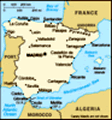Advertisement
Published: February 29th 2012
Spain has two big sales times a year, one in August, and the other from January through February. Literally everything is on sale, and everything is at least half off. These are some good deals. It’s a bit of a race this last week to find everything that I want to buy before the rebajas are gone. I’ve been going a little shopping crazy, and that is totally not me at all. I hate shopping—unless it’s at TJ Maxx. But I have been going shopping at least twice a week to search out all the things I want to buy with the best deals. I have two main objectives: shoes and jewelry. Not just any shoes; I can get those in the US. I want shoes that are made in Spain—good quality leather Spanish shoes. I have had a lot of luck with this and have bought eight pairs. I think I can stop buying shoes now. The jewelry I want is called damasquinado. My mom has a bracelet that her grandparents got in Spain and it has black stone inlaid with gold. It’s really beautiful, but I haven’t found it yet.
Every week we have a class called Granada
Seminar, and each week it covers a different aspect of Spanish culture. The first week, we talked about olive oil. It’s pretty incredible when you think about it, but olive oil has been a part of life all throughout history. Archeologists have found evidence of the consumption of olive oil as early as 4000 BC. The first olive oil was developed in the region of Palestine, Crete, and Egypt. The oil moved into the Mediterranean where production took off. Olive oil has been used for everything from perfume and cosmetics to lighting, it was used in the church, and of course consumed. Olive oil production has now spread to every continent besides Antarctica because it can survive the cold, the wind, and intense heat.
If you’ve ever wondered what Virgin and Extra Virgin means for olive oil, we found out in Granada seminar. Olive oil is not handled at all by hand, so this is why it is called virgin. It goes through a three step process of mashing, pressing, and separating the water from the oil. There is no alteration or heating of the olive oil; this is only done for lower quality oil, and of course it
cannot carry the name “virgin.” So if you have extra virgin olive oil, it’s the best quality; then just virgin olive oil. You won’t find lower quality oil in stores. This is bought by the government or for places that cook for a large number of people at once. I also learned that olive oil is extremely healthy for you. It helps increases good cholesterol, reduces the risk of heart attack, improves the function of the liver and pancreas, it’s an effective protector and moisturizer for the skin, improves metabolic function, and it helps with the absorption of calcium and minerals. So pretty much I learned that I should have olive oil all the time.
Our next seminar discussed the gitanos (or gypsies). Gitanos are very interesting because no one knows for sure where they came from. In the 15
th century, people thought they came from Egypt because of the color of their skin, and the word
gitano is actually a misspelling of
egiptanos. Now researchers think they came from India, then spread to Egypt and throughout Europe. There has been persecution of the gitanos ever since Biblical times, mainly because people can’t trust someone who has no homeland.
Gitanos all have a similar social structure that causes problems with the countries they live in. They are patrilineal societies with age determining your level of authority. The major problem with gitanos is that they do not accept the laws of the country they inhabit. They don’t want to pay taxes, obey the laws like the minimum age for marriage, and they don’t want to send their kids to school. For this reason, they tend to live on the outskirts of society. The gitanos in Spain are unique because they have flamenco. No other group has this culture of music, singing, and dance. The gitanos in Spain developed this when they adapted to the Spanish culture.
We get to experience each theme that we cover in Granada seminar. We’re going to an olive oil tasting next month, we get to see a flamenco performance too, and next week, we have a wine tasting. I’m really enjoying these sessions because I get to see a lot more of what Spanish culture is all about. I mean, who would have guessed how important olive oil was.
Advertisement
Tot: 0.211s; Tpl: 0.013s; cc: 6; qc: 24; dbt: 0.1264s; 1; m:domysql w:travelblog (10.17.0.13); sld: 1;
; mem: 1.1mb







